Author | jk, Odaily Planet Daily
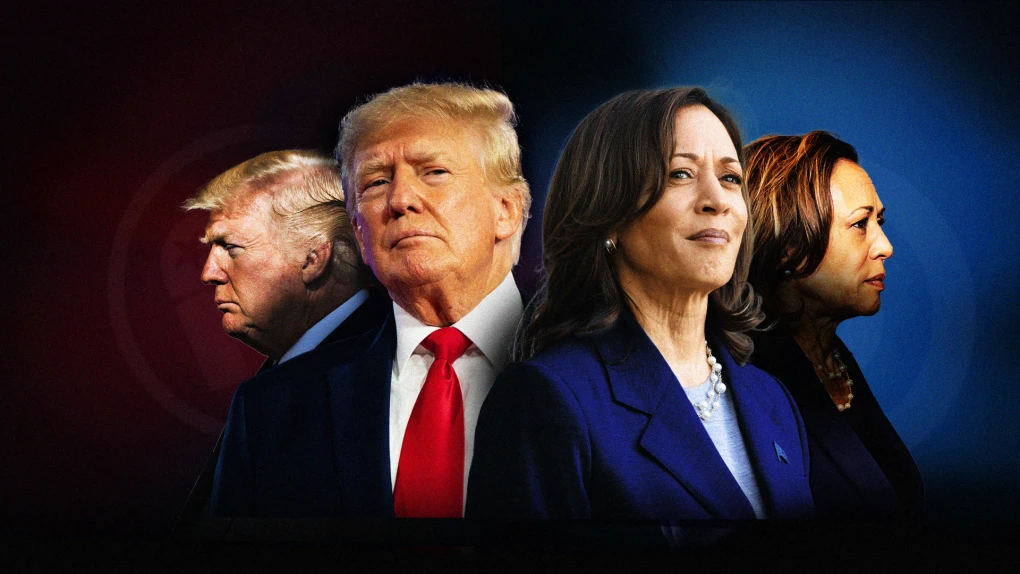
November 5 is the presidential election day in the United States, and it will be a day that profoundly impacts the global situation for the next four years. In this upcoming U.S. election, voters' choices will influence U.S. policy direction, China's policy responses, as well as the trends in cryptocurrency and the stock market.
This informative post will detail the election mechanism, timeline, winning probabilities, and public opinions on the candidates. Through this analysis, whether you are an enthusiastic observer of the election or an investor interested in the cryptocurrency market, you will gain a deeper understanding of the current political situation and its potential impact on the future economy.
Background Knowledge: Why Did Trump Win the U.S. Presidency in 2016 with Fewer Votes?
U.S. presidential elections are held every four years. First, each state conducts primaries or caucuses, where voters cast their ballots for their preferred candidates. Based on the primary results, major political parties hold national conventions to formally nominate their candidates. The leading candidates currently are Donald Trump from the Republican Party and Kamala Harris from the Democratic Party.
The official presidential election takes place on the first Tuesday of November (this year, it is November 5 in U.S. local time). In this election, voters actually cast their votes for electors (similar to representatives of the public), rather than directly voting for one of the two candidates. Each state allocates electors based on its population, with a total of 538 electors across the country. Most states use a "winner-takes-all" system, meaning that the candidate who receives the most votes in a state will receive all of that state's electoral votes.
Here is the first point to note about the U.S. election: in the presidential election, voters are voting for electors, who typically represent a specific party. The political stance of the electors, as well as whether they support Trump or Harris, is usually clear before the election, so the results of the voters' ballots often directly reflect which candidate will receive the majority of the electors' support, or even all of the electors' votes from that state, which is the traditional concept of "red states" and "blue states."
For example, if Elector A from California, representing the Democratic Party, receives the most popular votes in that state, then all of California's electoral votes (a total of 55 electoral votes) will go to the Democratic candidate Harris, regardless of the political stance of other electors.
Therefore, by analyzing the distribution of electoral votes in November, it is usually possible to predict with reasonable accuracy who will ultimately become president, and we will see this result next week.
To be elected president, a candidate needs to obtain at least 270 electoral votes. The election results are typically confirmed at the Electoral College meeting in December, where the electors vote to elect the new president. The second point to note is that while electors generally vote according to the will of the voters (i.e., their previously advertised political stance), in some cases, individual electors may choose to "betray" their candidate and vote for another candidate. Although this situation is relatively rare, it does exist, so theoretically, the final voting results of the Electoral College may not necessarily align completely with the voters' results.
In the 2016 U.S. presidential election, Hillary Clinton received more popular votes, approximately 65 million votes, accounting for 48.2% of the total votes. Donald Trump received about 63 million votes, accounting for 46.1% of the total votes. Despite Hillary leading in popular votes, Trump won more electoral votes, ultimately being elected president with a result of 304 votes to 227.
The final results of this year's electoral votes are expected to be announced late on November 5 in U.S. local time, which corresponds to the afternoon of November 6 in Beijing time.
Trump vs. Harris: What Are the Winning Probabilities?
Currently, in most polls predicted by authoritative agencies, whether from media leaning towards the Democrats, Republicans, or neutral organizations, Harris still holds an advantage, but it is only by one or two percentage points. According to neutral media Project 538, the average of major poll results shows that as of November 1, Harris has a winning probability of 48.0%, while Trump has a winning probability of 46.8%. Other data statistics websites show similar results, such as The New York Times reporting Harris at 49% compared to Trump's 48%; and 270towin showing Harris at 48.4% versus Trump's 47.2%.
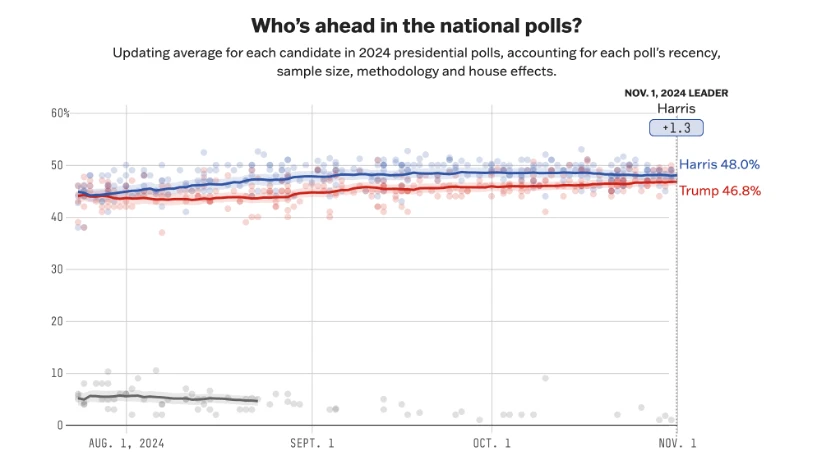
Harris leads in polls by an average of 1.3%. Source: Project 538
Previously, results from Fox News (a Republican-leaning media) and CNN (a Democratic-leaning media) also supported this conclusion.
This result contrasts sharply with the current results from the cryptocurrency prediction platform Polymarket; according to a previous article by Odaily Planet Daily titled "As the U.S. Election Approaches, Is Polymarket's Data More Reliable?", it was observed that Trump's winning probability had stabilized around 60%, while Harris was below 40%. As of the publication of this article, the total amount in this prediction market has reached $2.38 billion, with Trump's winning probability slightly declining and Harris's probability increasing. It can be seen that the Polymarket market has been moving closer to the poll results over the past week, although Trump still firmly occupies the main position.
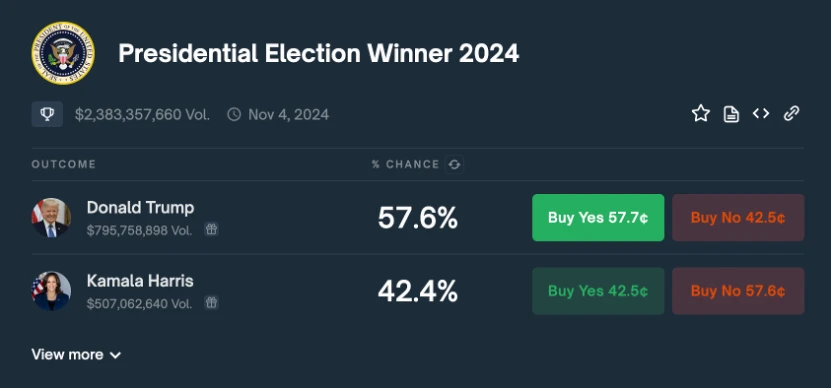
Presidential election predictions on Polymarket. Source: Polymarket
Observing the Situation: Zuckerberg's Shift, Harris's Twitter Exploded
As the election situation has developed, many amusing events have occurred. Business tycoons like Musk openly support Trump, while a "letter of apology" written by Meta CEO Mark Zuckerberg to the Republican Party has gone viral online.
According to Sina Finance, on August 26, Zuckerberg stated in a letter to Jim Jordan, the Republican chairman of the U.S. House Judiciary Committee, that he would maintain political "neutrality" during this election cycle and stop donating to local government elections to avoid being perceived as politically biased. Previously, he was generally considered a staunch supporter of the Democratic Party, and this letter may be seen as his "loyalty oath" to the Republicans.
He also publicly criticized Biden administration officials for "constantly" pressuring Facebook in 2021 to review posts related to the pandemic. Zuckerberg expressed regret over the company's compliance with these demands. Some people even believe that he shifted to the Republican side because he noticed trends in this public opinion center, Facebook.
When the House Judiciary Committee's X account publicly shared this letter, it stated: "Mark Zuckerberg admits three things in this letter—first, the Biden-Harris administration 'pressured' Facebook to censor Americans; second, Facebook censored Americans; third, Facebook suppressed information about Hunter Biden's laptop." According to Bloomberg, the authenticity of this letter has been confirmed by Meta.
Additionally, on the current X platform, debates are rampant, and the comments under candidate Harris's tweets are predominantly negative. Under her latest tweet, "I will be the president for all Americans," the comments are overwhelmingly critical: "You will not be the president for any American," "You will not become president," "You can't even be considered the vice president for all Americans," people are saying.

Comments section of Harris's tweet, Source: X
Almost all of Harris's tweets have this tone, reminiscent of Trump in 2016. Some netizens believe the only reason to vote for Harris is "disliking Trump."
Meme Trends: Does Harris's Meme Have a Chance?
Currently, the largest meme coin associated with Trump, MAGA, has maintained a price range between $3 and $4, with minor fluctuations, seemingly waiting for the final election results to be announced. This sideways trend has persisted for about two weeks.
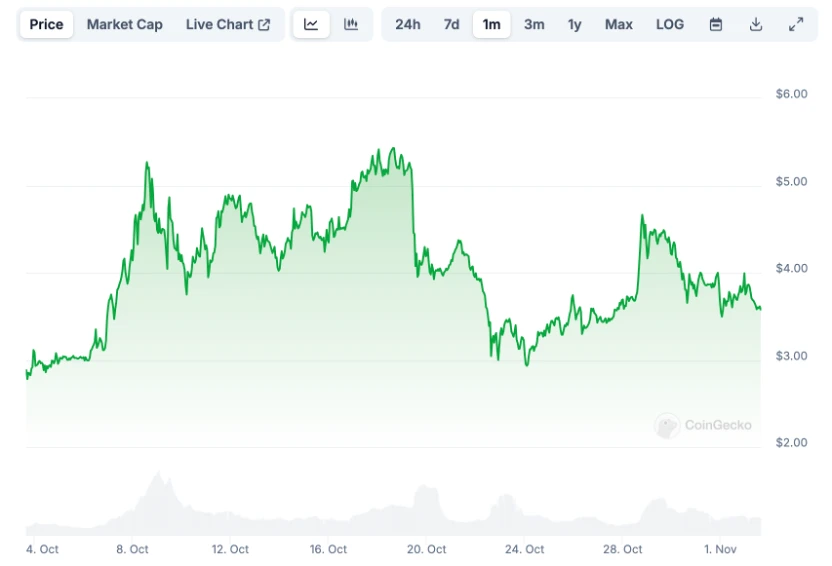
MAGA price trend, Source: Coingecko
In contrast, Harris's meme coin concept has recently gained traction, with KAMA experiencing a short-term surge of about 20%, rising from around $0.006 to approximately $0.0099, and its market capitalization has also increased to $9.966 million. Although this is still small compared to Trump, it may reflect growth in this market. After all, Trump's concept is relatively mature, with various NFT concepts attracting hot money, while Harris's related concepts have relatively more room for growth.
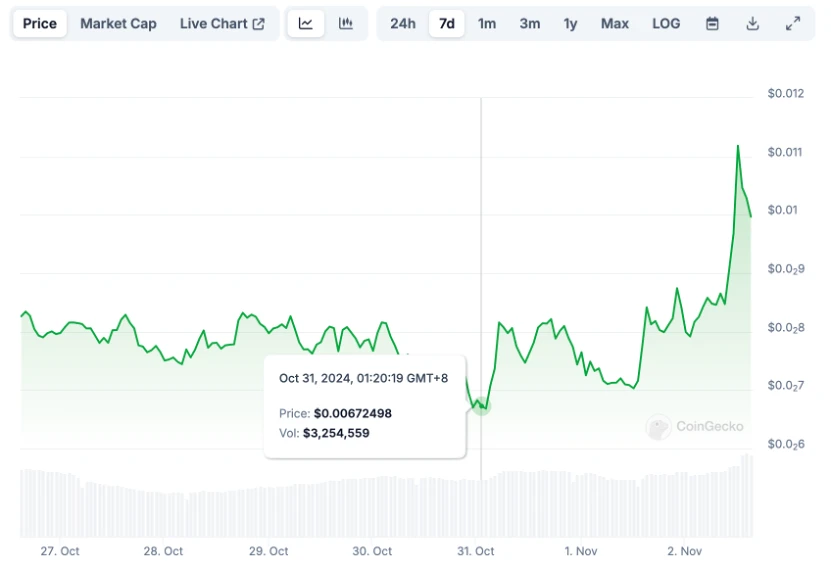
KAMA price trend, Source: Coingecko
Here, Odaily Planet Daily reminds readers that meme volatility is significant, and this presidential election will likely see the largest fluctuations in concepts in the short term. Therefore, there is a high possibility of a "Sell the news" event, meaning that the victory of a candidate may not lead to the expected surge in meme tokens, but rather a collective sell-off by previous whale addresses, so please be aware of the risks.
However, regarding the ever-changing international situation, unless a more significant event disrupts expectations occurs in the future, including but not limited to: electors betraying their party leading to a change in the final December election results from the "predetermined" results in November, a candidate and their party being found guilty of election fraud rendering the results invalid, or events similar to the previous "Capitol Hill riot," or even a candidate following in Kennedy's footsteps, the election results will be the final expected release for meme coins in the short term.
Timeline of the U.S. Election So Far
February 2: A judge in Washington, D.C. indefinitely postponed Trump's election interference trial.
March 4: The U.S. Supreme Court unanimously ruled in Trump v. Anderson that proposals to remove Trump from the ballot in Colorado, Illinois, and Maine under the Fourteenth Amendment are unconstitutional.
May 30: Trump was found guilty on all 34 counts in a trial in New York, becoming the first U.S. president to be convicted.
July 1: The U.S. Supreme Court ruled 6-3 in the Trump case, dividing along ideological lines, determining that Trump enjoys absolute immunity for actions within the core scope of his constitutional authority, and at least a presumption of immunity for official actions within the outer bounds of his official responsibilities, while no immunity is granted for unofficial actions. Trump's sentencing date in New York was postponed from July to September 2024, and trial dates for Trump's other cases may also be delayed to review the applicability of the Supreme Court's ruling.
Since July 1, more than 20 representatives have called for Biden to withdraw from the race.
July 13: Trump was shot at a campaign rally in Butler, Pennsylvania, sustaining a gunshot wound to the ear. One bystander and the shooter were killed, and two others were injured.
July 15: The 2024 Republican National Convention was held in Milwaukee, Wisconsin. Trump announced U.S. Senator JD Vance as his vice presidential candidate, who was subsequently confirmed as the Republican presidential nominee.
July 17: Biden stated that he would consider withdrawing from the race if formally diagnosed with a medical condition. Shortly after, Biden tested positive for the coronavirus.
July 21: Biden announced his withdrawal from the race and initiated "emergency transition procedures" for the Democratic nomination. Vice President Kamala Harris announced her candidacy for president.
August 6: Kamala Harris announced Governor Tim Walz as her vice presidential candidate.
September 15: A shooting incident occurred while Trump was golfing at the Trump International Golf Club in West Palm Beach, Florida. Trump was unharmed and was evacuated by Secret Service personnel.
October 29: Biden responded via video call to a comedian at Trump's rally at Madison Square Garden, referring to Trump's supporters as "garbage," which led to a rebuttal from Harris. This was seen by many as potentially damaging to the Democratic effort to attract undecided voters, while also making a significant portion of Trump's American supporters feel marginalized.
November 5 (the first Tuesday in November): Election Day.
免责声明:本文章仅代表作者个人观点,不代表本平台的立场和观点。本文章仅供信息分享,不构成对任何人的任何投资建议。用户与作者之间的任何争议,与本平台无关。如网页中刊载的文章或图片涉及侵权,请提供相关的权利证明和身份证明发送邮件到support@aicoin.com,本平台相关工作人员将会进行核查。



